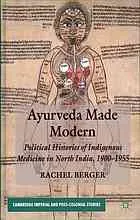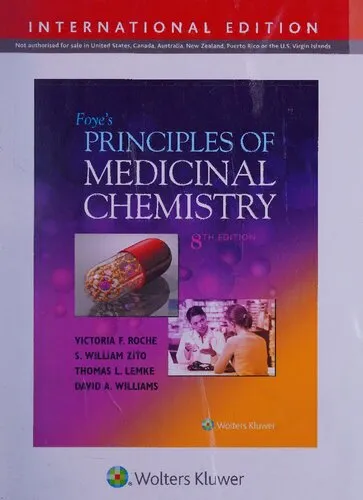Ayurveda made modern : political histories of indigenous medicine in North India, 1900-1955
4.2
Reviews from our users

You Can Ask your questions from this book's AI after Login
Each download or ask from book AI costs 2 points. To earn more free points, please visit the Points Guide Page and complete some valuable actions.Related Refrences:
Introduction to "Ayurveda Made Modern: Political Histories of Indigenous Medicine in North India, 1900-1955"
Ayurveda Made Modern explores the fascinating transformation of Ayurveda—a centuries-old Indian system of medicine—during a period of tremendous political, cultural, and societal change in North India. This book delves into the years between 1900 and 1955, a period marked by British colonial rule, nationalist movements, and India’s transition to independence. These upheavals set the stage for significant redefinitions of Ayurveda, as medical practices and philosophies interacted with modernity, Western systems of medicine, and nationalistic ideologies.
The book offers readers a rich historical narrative, meticulously analyzing how Ayurveda's evolution during this period was deeply tied to the political and cultural dynamics of the time. Highlighting intersections between medicine, nation-building, and identity, this work illustrates how Ayurveda, often considered "traditional," was modernized and repackaged to meet contemporary needs. By weaving together archival research, critical interpretations, and cultural history, Ayurveda Made Modern unfolds the story of how this indigenous medical system was shaped, politicized, and redefined.
Detailed Summary of the Book
Ayurveda Made Modern is structured around key themes that illuminate different aspects of Ayurveda's transformation during a dynamic half-century. Beginning with the colonial state's relationship with indigenous medicine, the book contextualizes how Ayurveda was marginalized under British rule, yet persisted through local practices and knowledge systems. As modern biomedicine gained prominence, Ayurveda faced pressure to justify its validity in scientific terms.
The central narrative shifts to the role of Indian nationalism in reviving Ayurveda. Leaders of the nationalist movement, such as Mahatma Gandhi and others, promoted Ayurveda not only as a symbol of indigenous pride but also as a counterpoint to Western medicine, which they associated with colonial control. However, this revival also brought challenges. Ayurvedic practitioners had to reconcile traditional healing practices with the demands of modern science, often leading to debates within the Ayurvedic community itself.
The book further explores how Ayurveda adapted to the post-independence landscape. With the creation of a new Indian state in 1947, Ayurveda became a site of negotiation between tradition and modernity. Efforts were made to institutionalize Ayurvedic education, regulate practitioners, and merge Ayurveda with public health initiatives. This period witnessed the creation of state-supported Ayurvedic colleges, standardized medical texts, and legislative frameworks—developments that sought to establish Ayurveda as a recognized medical system in a modern nation-state.
Key Takeaways
- Ayurveda's evolution between 1900 and 1955 was deeply intertwined with India's political and cultural history.
- The colonial state's policies marginalized Ayurveda but also motivated its reorganization and defense as a scientific tradition by practitioners.
- Indian nationalism played a crucial role in rebranding Ayurveda as a symbol of indigenous identity and cultural pride.
- Modernizing Ayurveda brought internal debates about its authenticity, scientificity, and relevance in a changing society.
- The institutionalization of Ayurveda post-independence was key to its survival and influence in contemporary India.
Famous Quotes from the Book
- "The reinvention of Ayurveda during the colonial and nationalist periods reveals not just a medical system but a political and cultural identity reshaped by modernity."
- "Ayurveda did not remain static; it evolved through negotiations with science, modernity, and its practitioners' aspirations for relevance."
- "In the imagination of Indian nationalists, Ayurveda was more than medicine—it was a metaphor for self-rule, cultural pride, and independence."
Why This Book Matters
Ayurveda Made Modern is an essential read for anyone interested in the intersections of medicine, history, and politics. The book sheds light on how indigenous knowledge systems like Ayurveda were not isolated from larger historical forces. Instead, they adapted and transformed through interactions with colonialism, modern science, and nationalism.
Today, as Ayurveda continues to gain global recognition, understanding its historical journey is more relevant than ever. This book contextualizes contemporary debates about the role of traditional knowledge in a globalized world. Moreover, it challenges simplistic binaries of "traditional" versus "modern," illustrating that Ayurveda's evolution has always been dynamic and pluralistic.
For scholars of history, medicine, and cultural studies, Ayurveda Made Modern provides a compelling case study of how indigenous systems of knowledge navigate power, identity, and change. It emphasizes that even as systems like Ayurveda are modernized, they carry with them the legacies, struggles, and traditions of their past.
Free Direct Download
You Can Download this book after Login
Accessing books through legal platforms and public libraries not only supports the rights of authors and publishers but also contributes to the sustainability of reading culture. Before downloading, please take a moment to consider these options.
Find this book on other platforms:
WorldCat helps you find books in libraries worldwide.
See ratings, reviews, and discussions on Goodreads.
Find and buy rare or used books on AbeBooks.





![The Ultimate iOS Interview Playbook: Conquer Swift, frameworks, design patterns, and app architecture [Team-IRA]](https://s3.refhub.ir/images/thumb/The_Ultimate_iOS_Interview_Playbook__Conquer__29925.webp)







